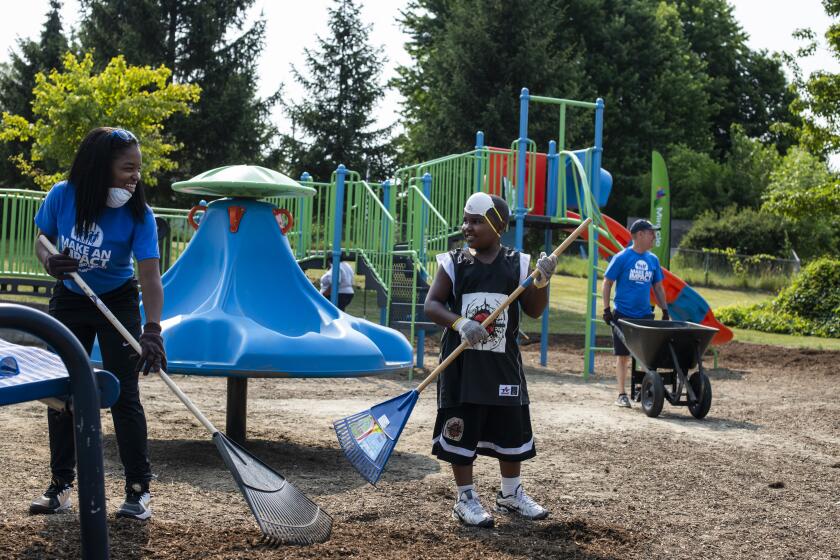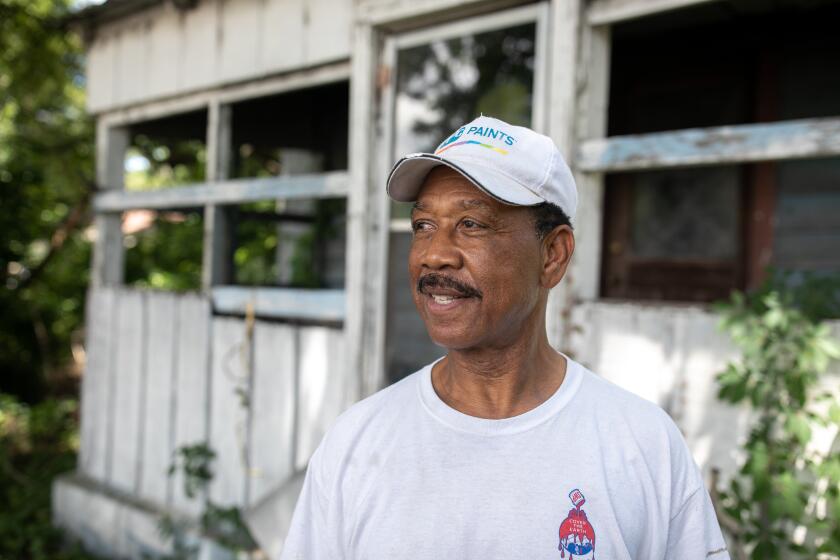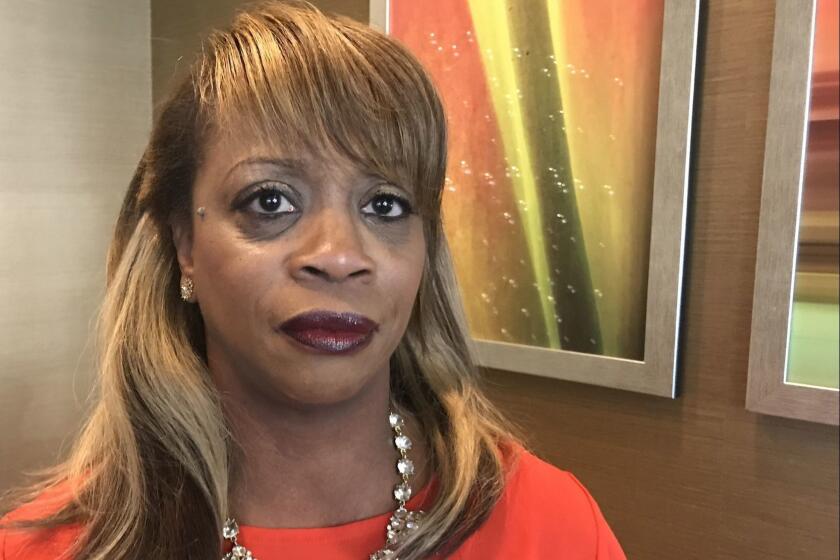Black voters to 2020 Democrats: Don’t take us for granted
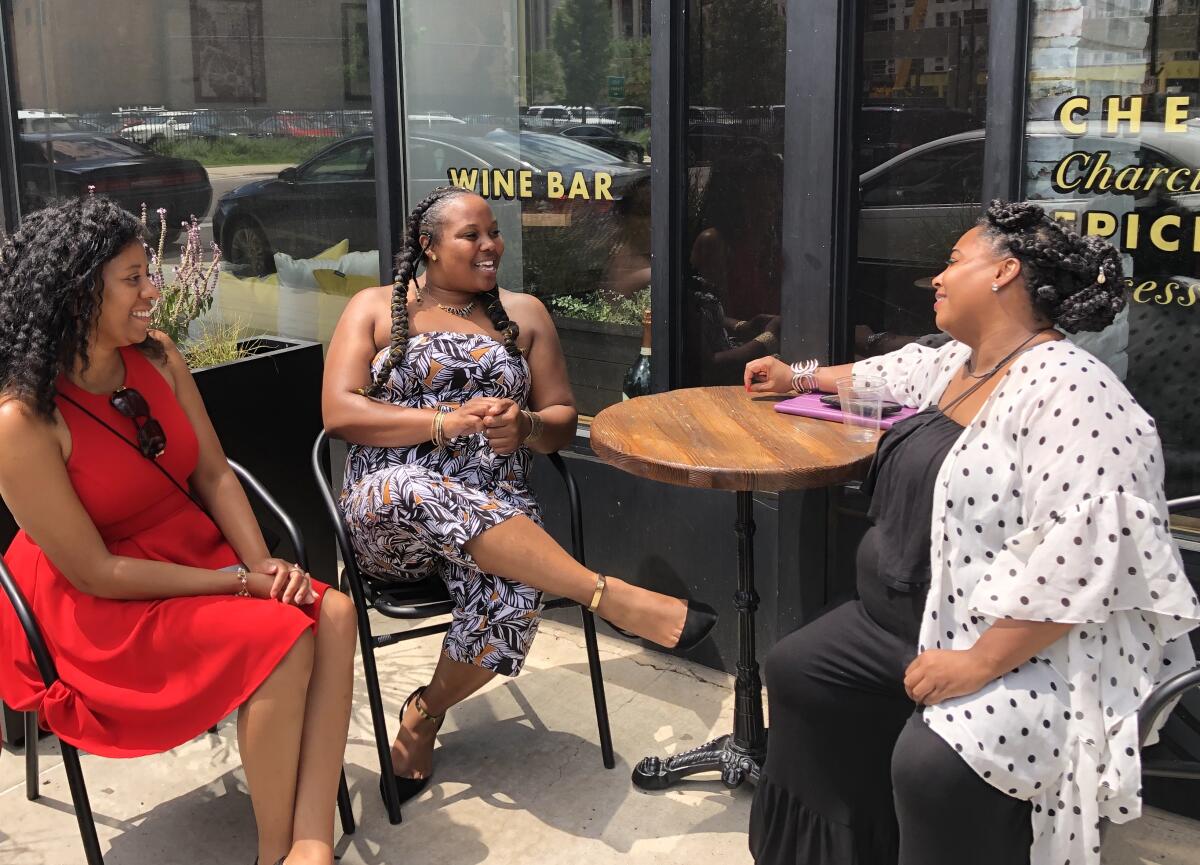
DETROIT — Oriana Powell’s decision not to vote in the 2016 presidential election haunts her.
In the 2 1/2 years since Donald Trump won her traditionally Democratic home state of Michigan by fewer than 12,000 votes, she says she’s been alarmed by the way he’s inflamed racial tensions and anti-immigrant hostility.
“I didn’t really contemplate what that would mean — giving it to the other side,” said the 30-year-old Democrat and Detroit native.
Powell’s definitely voting in 2020. And she’s doing more than that. She’s joined the front lines as a grass-roots political organizer in hopes of exciting other black women voters in and around Detroit about ousting President Trump from the White House.
There’s just one problem: Many of her fellow African American voters, a core segment of this state’s Democratic base, also believe the party let them down. In Detroit in 2016, voter turnout dipped compared with the two previous presidential elections.
The love just wasn’t there for Hillary Clinton the way it was for Barack Obama among black voters in Michigan, or in traditional urban strongholds in Pennsylvania and Wisconsin, where Trump eked out the victories that put him in the White House.
This time feels different. African Americans here — working moms like Powell, LGBTQ people, workers in the gig economy — expressed deep passion about voting in 2020. But Democrats can’t take them for granted.
Voters in this city, which is 80% African American, say they’re fed up with helping Democrats win, only to be undermined, sidelined or forgotten later. They want assurances that the 2020 presidential candidates will deliver on promises that help get them elected.
Powell, who voted twice for Obama before sitting out the last presidential election, gave birth to her first child in 2017. That life-changing event inspired her to get more involved, but it took some time to figure out how.
“Being a black woman in Detroit, I was always aware of what’s happening,” Powell said. “But I didn’t see myself in the solution.”
She’s now fighting for issues such as affordable childcare and family medical leave.
Detroit hosts the July Democratic debate. Some candidates have campaigned in nearby Flint, but the city’s struggles and water crisis haven’t been a focus.
Powell was speaking outside the #NoCountryForBlackMamas conference hosted by Mothering Justice, a grass-roots group that brings together African American mothers to talk about their lives while building voter enthusiasm around issues they want elected officials to tackle.
Mass incarceration is a big issue for Powell — as well as the women at the gathering — and a reason that Clinton left her cold.
For a large chunk of her childhood, she lived without her father, who served seven years in prison on drug charges.
She holds Clinton partly responsible because of her support for the crime bill her husband, President Clinton, signed in 1994, which helped fuel a rise in the U.S. prison population, disproportionately putting young black and brown men behind bars.
“I was 15 years old when my dad got out of prison,” Powell said. “My family was broken because of that.”
Now she feels shaken by the injustices of the present day. The Trump era has given her a renewed passion for politics.
“As horrible as it has been to watch Donald Trump and his administration, it has also brought to a lot of people’s attention things we need to feel as Americans,” she said.
Other voters, disappointed over the Democrats’ failure to fix key problems in the black community, such as high jobless rates, rampant home foreclosures, poor schools and business decline, may be harder to bring back.
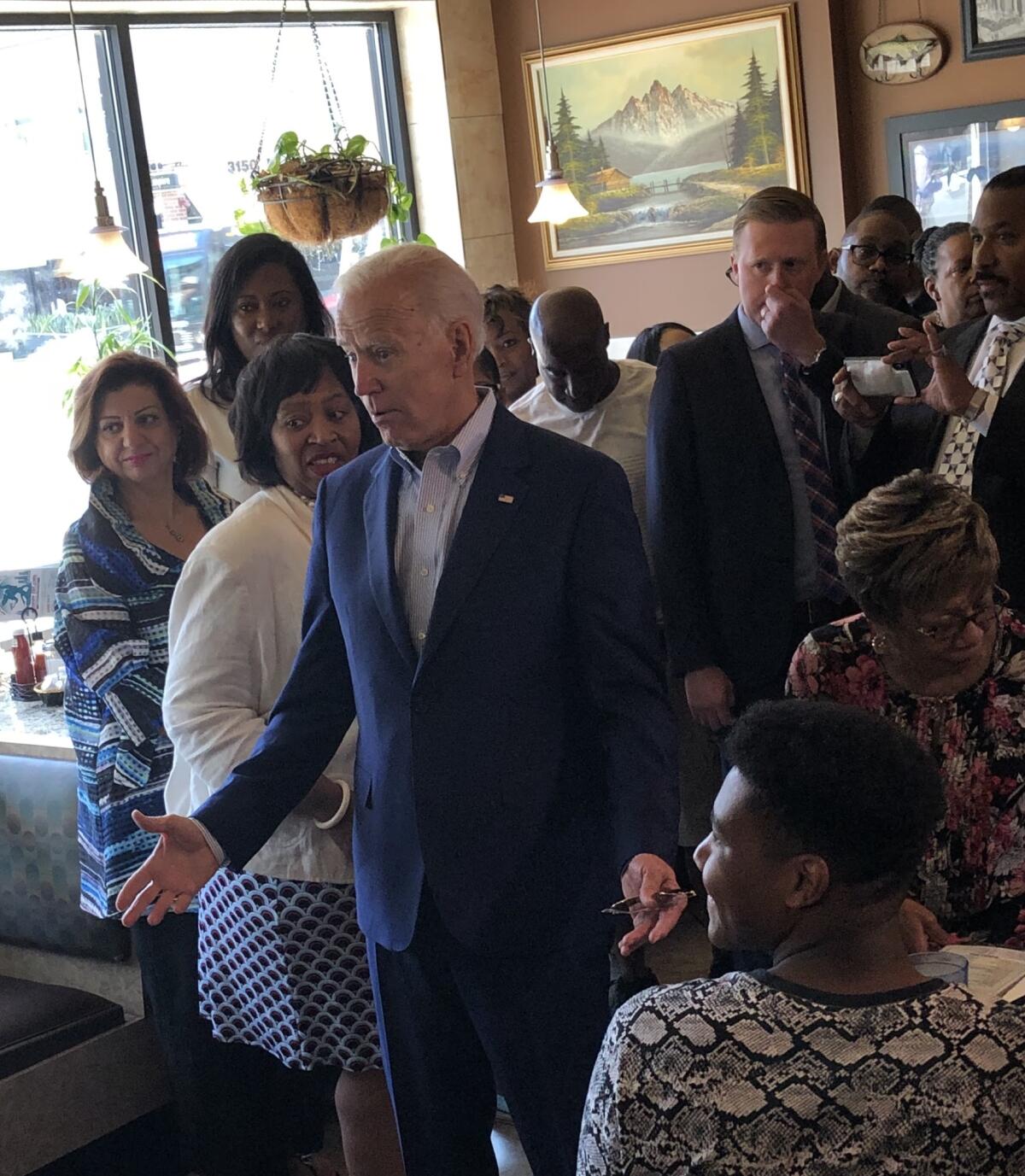
Marshall Kilgore, 20, served last year as a field organizer for Democrat Gretchen Whitmer’s successful bid for governor and a precinct delegate in get-out-the-vote efforts in Detroit.
He acknowledges that black voters are tired of “the same ole, same ole,” but he’s not giving up hope on those who sat out 2016 or voted for someone other than Clinton.
“Trump told us, “What do we have to lose?” Kilgore said, recalling Trump’s campaign pitch to black voters.
“What I’ve been hearing is people want experience, because wow, what a mess we have.”
Ahead of the midterm election last year, Kilgore organized a bus tour around Michigan featuring Whitmer and other Democrats running for statewide office, to show voters that the election wasn’t just about helping individual candidates but about presenting a united front to take on economic and other issues.
John Ware, an African American who’s been living in the same working-class section of southwest Detroit since the 1960s, isn’t sold.
“They’re all liars,” said Ware, 56.
He didn’t vote in 2016 and feels so exasperated with politicians that he doesn’t know what they could say to get him to vote next year.
The debate over reparations for slavery is getting new attention through the 2020 presidential race. For the descendants of slaves in South Carolina, it’s personal.
Detroit was a more hopeful place for African Americans when Ware was growing up.
Known as Motor City or Motown, Detroit is the adoptive hometown of boxing great Joe Louis and Queen of Soul Aretha Franklin.
It’s one of the Northern and Western cities, including Los Angeles, where millions of black Southerners settled after fleeing racial violence, poverty and segregation during the Great Migration in the first half of the 20th century.
Working mainly in the Detroit area’s once-booming auto factories, they established a thriving black middle class that filled their cousins still living down South with envy.
That was then.
The city’s long economic downfall and home foreclosure crisis have been as epic as the 1960s songs of yearning and heartache that spun out of Hitsville USA, the nickname for Studio A at Berry Gordy’s Motown Records on West Grand Boulevard.
Out for a walk along Electric Street, a block over from Edsel Street, Ware talks about the demolished homes in the area.
Catrena Norris Carter is a bundle of conflicting impulses.
“There’s lots big enough to play baseball in,” said Ware, who does odd jobs for a living. “They’re fixing up downtown. But for who? Not for me or my people.”
At Eastern Market, a popular open-air shopping complex in a section of downtown with rows of boarded-up storefronts, the Queen of Soul’s niece Crystal Franklin sells Detroit-centric clothing from a stall to make extra money, because her job as a flight attendant doesn’t cover all of her monthly expenses.
Franklin, 46, has a daughter attending Howard University, the historically black alma mater of presidential candidate Kamala Harris. She likes that the California senator talks about education and healthcare reform, especially given that her daughter’s $160,000 in college loans, and her own bills from a bout with skin cancer in 2015, have pushed the family deep into debt.
“That’s why I’m out here hustling at Eastern Market on Sundays,” Franklin said.
When the Democrats held their second round of debates in Detroit in July, Michigan’s shuttered factories and economically depleted cities received only a rhetorical peck on the cheek in nearly five televised hours over two nights. Black voters here are just as noncommittal when asked to pick a favorite candidate.
“It’s like, I’ve got all of this love to give and I’m just waiting for my suitor to come and let me love on ‘em — but I know my worth,” LaTarro Traylor joked, referring to the candidates.
Traylor, 36, is a small-business attorney 150 miles away in Grand Rapids, which, like Detroit and nearby Flint, fell into a years-long slump. The Democrat voted for Obama twice but made a conscious decision not to vote for president in 2016, a choice she stands by today.
“It’s always our job to save the world,” she said of the much-ballyhooed importance of black voters like herself to the Democrats. “But it’s like we don’t matter policywise.”
A sign declaring “Nothing stops Detroit” hangs in a storefront along Woodward Avenue in downtown Detroit, one of many efforts aimed at lifting the spirits of locals in the struggling city.
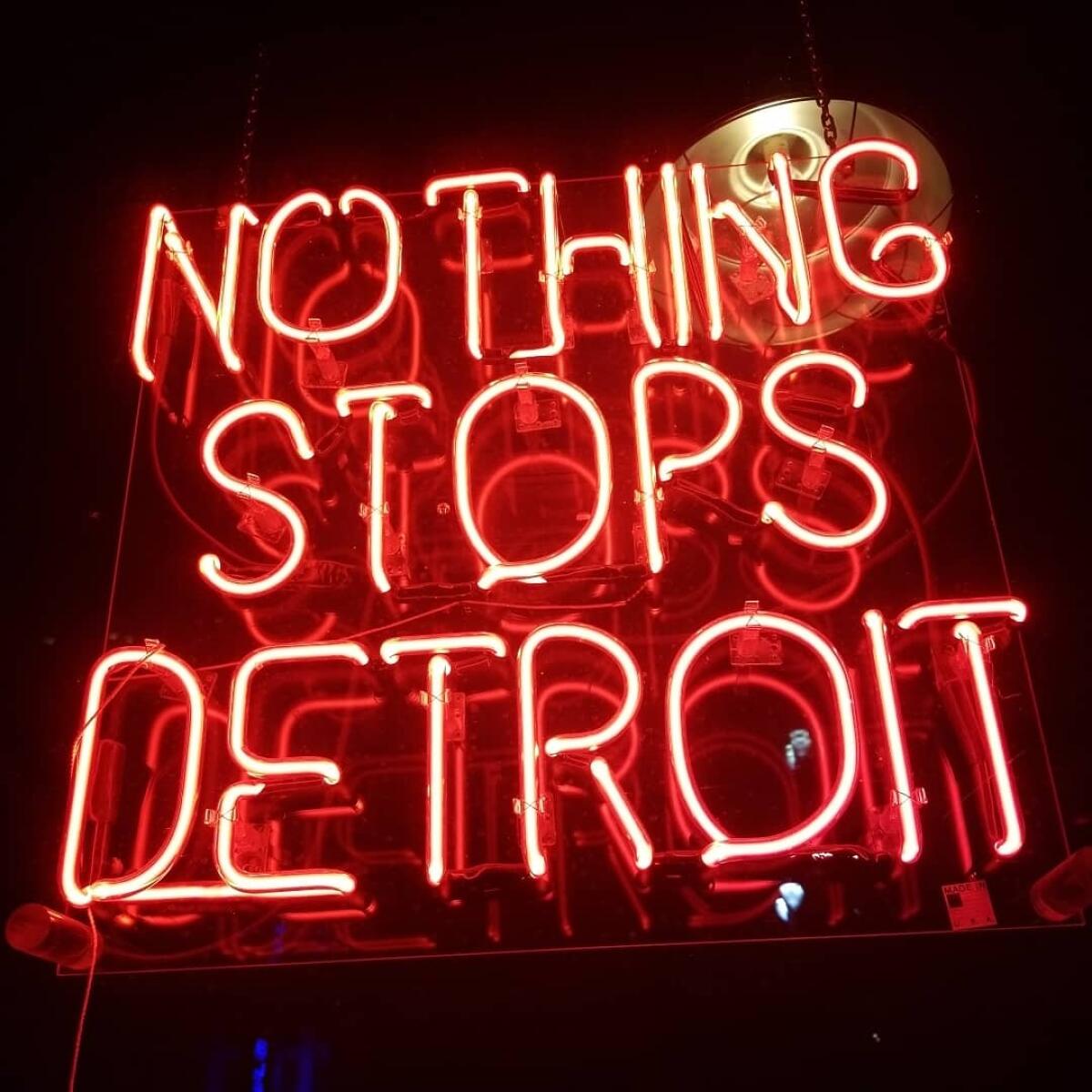
That gusto could be felt at the Black LGBTQ Pride festival a few weeks ago at a park in north Detroit.
With groups picnicking in the shade and DJs spinning rump-shaking house music, the atmosphere was somewhere between a backyard barbecue and a nightclub.
A parking lot voguing competition, a la the hit TV show “Pose,” got the crowd waving and hollering as competitors strutted like Naomi Campbell, froze their faces in diva glares that’d put Diana Ross to shame and twirled like dancers in a “Soul Train” line.
Jeynce Poindexter, co-host of the vogue competition, said she didn’t hear her LGBTQ community’s struggles mentioned during the debate. That kind of oversight could make it harder for activists like her to get other trans people of color interested in voting.
“We’ve got to be intentional about living up to the diversity that the Democrats love to shout about,” said Poindexter, 37.
Nearby, L. Michael Gipson, 44, held court with a group of fellow big men, known in the gay world as “bears.”
He had some advice for the Democrats, who learned the hard way in 2016 that African Americans can make the difference between victory and defeat.
“If you’re not the most exciting candidate, you have to make sure that people are aware they’ll have a voice in your campaign or administration,” Gipson said.
To get black voters like his fellow bears to the polls, he said, “Trump is not enough.”
More to Read
Get the L.A. Times Politics newsletter
Deeply reported insights into legislation, politics and policy from Sacramento, Washington and beyond. In your inbox three times per week.
You may occasionally receive promotional content from the Los Angeles Times.
